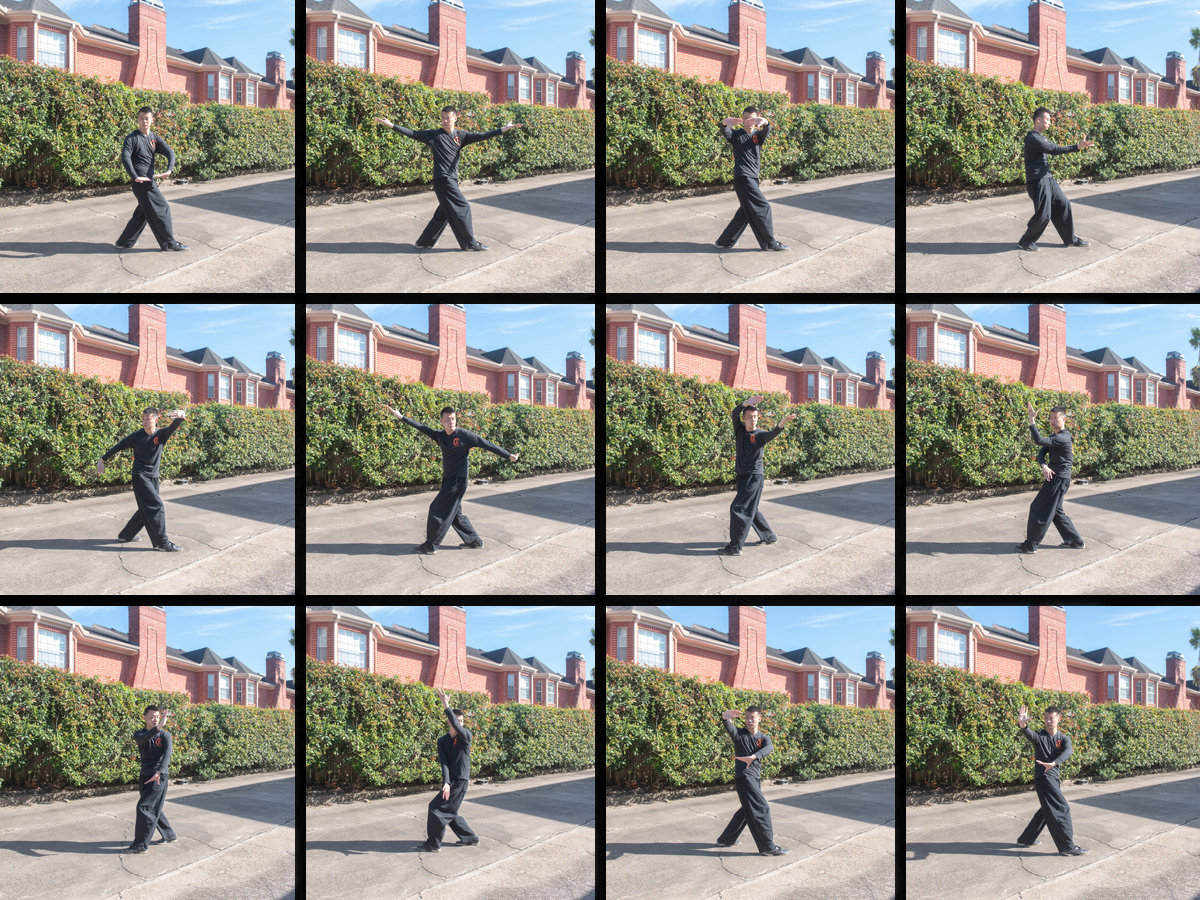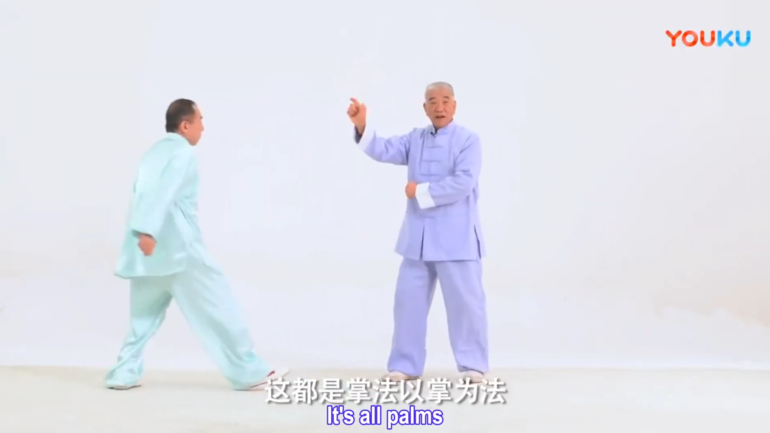In my other post Demystifying Bagua Circle Walking I did a high level breakdown of my Circle Walking Routine. Some people asked about how to Circle Walk or what postures to use. This post is to demo the 12 postures I use, for anybody that would like to referrence.
This is not the only way to do it. This is just one way to do it.
It’s also common practice across many people to walk with only one posture instead of changing into so many. I recommend picking 3 and sticking with it.
#1 推磨掌 / Tui Mo Zhang / Grinding Palm
The name really goes back to the old ways of making food. You had to push against this heavy stone equipment to grind all the beans. The posture resembles working this equipment.

This is how it looks like in Circle Walking practice.

The easier variation of this posture is facing “forward” rather than the center of the circle.
Beginners can start with this posture alone, facing forward. It’s not a bad idea to spend a month on this before you add other postures.

#2 托天掌 / Tuo Tian Zhang / Holding The Heaven
Like the name suggests, you’re basically carrying the sky. In the old ways of training, each hand would carry 4 bricks.

For an easier variation, you can also face “forward” for this posture.

#3 雙撞掌 / Shuang Zhuang Zhang / Double Push Palm
This posture is one of the most common postures to practice Xing Bu (Bagua’s linear stepping / footwork).

For an easier variation, you can also face “forward” for this posture.

#4 白猿獻桃 / Bai Yuan Xian Tao / White Monkey Gives Peach
Some practitioners just call this the Monkey shape. There is also another name used, Qi Xing, which translates to Seven Stars.

#5 陰陽魚 / Yin Yang Yu / Yin Yang Fish
This one is interseting because in the west, people generally call this the Bear shape. How we got from fish to bear, I have no idea. For beginners, the flexibility of the back hand’s shoulder could be a challenge.

The shape is called Yin Yang Fish because if you look at your arms from a birdseye view, the curve of the arms look like the “S-shape” in a Taichi Yin Yang diagram.

#6 陰手掌 / Yin Shou Zhang / Yin Hands

This one seems less common. Not many schools and lineages have a shape like this. The back hand is a hook.
When walking, front hand should point TOWARDS the center, and you should be looking towards the center as well.
#7 托槍手 / Tuo Qiang Shou / Spear Holding Hands
Also called Lion Opens Its Mouth, many times abbreviated to just Lion shape. There are different variations of this. For example, some lineages have the upper palm facing down instead of up. Some hold there back hand in front of their chest.
Traditionally, this shape resembles someone holding a spear.

Look at the similarities in the hand posture with someone actually holding a spear:

#8 上立樁 / Shang Li Zhuang / Upper Stance
Very similar to moves in Wing Chun wooden dummy practice. It is called “Upper” Stance because the front hand focuses on protecting the upper part of the body (including head).

Example of the shape in Wing Chun

#9 下立樁 / Xia Li Zhuang / Lower Stance
The reverse of the last one. The front hand focuses on protecting the lower part of the body. Also can be seen in Wing Chun. This is also very similar to the Philly Shell in boxing.

Wing Chun example

Here’s Philly Shell / Shoulder Roll

#10 上下立樁 / Shang Xia Li Zhuang / Upper and Lower Stance
Another name is called “Zhi Tian Cha Di”, which translates to Point Towards the Heaven, and Pierce Through the Earth.

This posture is a throw in Double Palm Change. Here’s a photo of another master doing it. This is Cheng De Liang, a direct descendent of Cheng Style Bagua (Cheng Ting Hua’s grandson).

#11 橫樁 / Heng Zhuang / Horizontal Stance
In the Single Palm Change form, this move is called “Push Open the Window to See the Moon.” This could be a strike or a throw, with hidden kicks and grappling. On a static posture, it aims to protect the chest and core area.

#12 青龍探爪 / Qing Long Tan Zhua / Green Dragon Stretches Its Claws
The most iconic posture in Bagua. This shape can also be practiced as a stance. Many people just call this Dragon shape. When practiced as a stance (static posture), the name is called Long Pan, or Coiling Dragon.

If you haven’t read this, make sure you at least put in 40 minutes for your circle walking practice: How and How Long to Circle Walk?
Join me in my 100-Day Circle Walking Challenge.
Peace out. Train hard. Do more Bagua.

